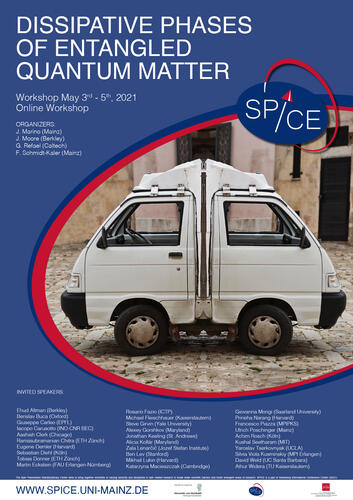Dear colleagues,
We are delighted to announce the SPICE-Workshop on “Dissipative Phases of Entangled Quantum Matter” which will be held from 3rd-5th of May, 2021 on-line.
Driven-dissipative quantum many body systems constitute a cross- disciplinary frontier of research encompassing condensed matter, AMO and solid state physics. Many-particle systems where quantum coherent dynamics and dissipative effects occur on the same footing, find experimental realization in cavity QED, driven open Rydberg systems, trapped ions, exciton-polariton condensates, coupled micro- cavity arrays — among the others. These platforms offer the unique opportunity to explore extensive phases of matter which cannot be encompassed through conventional statistical mechanics. Bringing this fields together in a common discussion platform is a main goal of this workshop.
The timely workshop shall bring together experts and young researchers from different communities: condensed matter physics, cold atoms, quantum engineering, quantum optics and atomic physics. These communities will be able to interact with the aim of forming new collaborations.
If you would like to attend the workshop, the application deadline is April 26th, 2021 (https://www.spice.uni-mainz.de/dpeqm-2021-home/) The workshop is free of charge to attend, but registration is mandatory in order to get the correct Zoom log-in information and further information.
We kindly ask you to share this information with colleagues and students that may be interested in participating. Any questions regarding the workshop can be directed to spice@uni-mainz.de.
Best regards,
Jamir Marino and Jairo Sinova
Organizers
J. Marino, Mainz
J. Moore, Berkley
G. Refael, Caltech
F. Schmidt-Kaler, Mainz
Invited Speakers
|
Ehud Altman, Berkley |
Alicia Kollár, University of Maryland |
